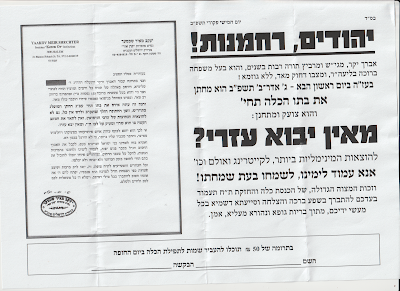When I saw this it made me very angry. This person is not asking for tzedaka because some tragedy happened to him. Rather, he is asking for tzedaka because he has NEVER tried to actually earn a living. He brought 15 children in the world and sat in kollel and didn't work. And now, as a result of HIS CHOICES he is poor so he wants people like me to pay for his daughters wedding. Why should I? It gets worse. He wants people to pay for a hall and a caterer. I made a wedding at the beginning of covid in my backyard, no hall no real caterer. Covid showed that it was very possible. So someone who has no money should make a wedding in a backyard (for free) and cook the food themselves with help from friends/neighbors and save all that money. Why should I pay for a hall and a caterer for him? If he wants to sit and learn and not make money then he should be מסתפק במועט. The Mishna says פת במלח תאכל not catered meals. Why should the person who sacrificed his learning, went to school, goes to work and makes some money pay for the wedding of this selfish person who only thinks about his own spiritual growth ignoring everyone else?
The fact is that this request is anti-Torah. The Gemara in Pesachim 113 states:
אֲמַר לֵיהּ רַב לְרַב כָּהֲנָא: הֲפוֹךְ בִּנְבֵילְתָּא וְלָא תֵּיפוֹךְ בְּמִילֵּי. פְּשׁוֹט נְבֵילְתָּא בְּשׁוּקָא וּשְׁקֵיל אַגְרָא, וְלָא תֵּימָא ״כָּהֲנָא אֲנָא, וְגַבְרָא רַבָּא אֲנָא, וְסַנְיָא בִּי מִלְּתָא״.
Rav said to Rav Kahana: It is better for one to turn over a carcass than to turn over his word, i.e., to break his promise. Rav further said: Skin a carcass in the market and take payment, but do not say: I am a priest, or: I am a great man, and this matter disgusts me.
רמב"ם הלכות מתנות עניים פרק י הלכה יח:
לעולם ידחוק אדם עצמו ויתגלגל בצער ואל יצטרך לבריות ואל ישליך עצמו על הצבור,
וכן צוו חכמים ואמרו עשה שבתך חול ואל תצטרך לבריות,
ואפילו היה חכם ומכובד והעני יעסוק באומנות ואפילו באומנות מנוולת ולא יצטרך לבריות,
מוטב לפשוט עור בהמות נבלות ולא יאמר לעם חכם גדול אני כהן אני פרנסוני,
ובכך צוו חכמים,
גדולי החכמים היו מהם חוטבי עצים ונושאי הקורות ושואבי מים לגנות ועושי הברזל והפחמים ולא שאלו מן הצבור ולא קיבלו מהם כשנתנו להם.
שולחן ערוך יורה דעה הלכות צדקה סימן רנה סעיף א:
לעולם ירחיק אדם עצמו מהצדקה ויגלגל עצמו בצער, שלא יצטרך לבריות. וכן צוו חכמים: עשה שבתך חול, ואל תצטרך לבריות.
ואפילו היה חכם מכובד והעני, יעסוק באומנות ואפי' באומנות מנוולת, ואל יצטרך לבריות.
When this avrech got married he gave his wife a כתובה which stated the following:
הוי לי לאנתו כדת משה וישראל ואנא אפלח ואוקיר ואיזון ואפרנס יתיכי ליכי כהלכות גוברין יהודאין דפלחין ומוקרין וזנין ומפרנסין לנשיהון בקושטא
“Be my wife according to the law of Moses and Israel.
I will work, honor, feed and support you in the custom of Jewish men,
who work, honor, feed, and support their wives faithfully. I will give
you the settlement of [...] silver zuzim, which is due you
according to [...] law, as well as your food, clothing, necessities of
life, and conjugal needs, according to the universal custom.”
Does anyone listen when the כתובה is read?
Many sources posit that man is in this world so that he avoids נהמא דכיסופא (literally free bread), which means that Hashem put us on this world so that we could earn our עולם הבא so we wouldn't be embarrassed by being נהנה מזיו השכינה for free, and yet that is all this avrech is doing in this world, taking things for free.
See this post of the Jewish Worker for additional examples.
